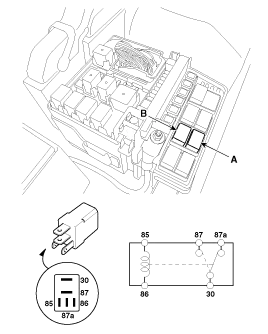Kia Cadenza YG: Fuses And Relays / Relay Box (Engine Compartment) Repair procedures
Kia Cadenza YG 2016-2021 Service Manual / Body Electrical System / Fuses And Relays / Relay Box (Engine Compartment) Repair procedures
| Inspection |
Power Relay Test (Type A)
|
Check for continuity between the terminals.
| A. Front deicer B. IGN2 relay C. Blower relay D. Burglar alarm horn relay E. IGN1 relay F. Cooling fan #1 relay | G. Cooling fan #2 relay H. Start relay I. Rear defogger J. Horn relay K. ACC relay L. Fuel pump relay |
| 1. |
There should be continuity between the No.30 and No.87
terminals when power and ground are connected to the No.85 and No.86
terminals. |
| 2. |
There should be no continuity between the No.30 and No.87 terminals when power is disconnected.
|
Power Relay Test (Type B)
Check for continuity between the terminals.
A : Rain sensor relay
B : Wiper relay
| 1. |
There should be continuity between the No.30 and No.87
terminals when power and ground are connected to the No.85 and No.86
terminals. |
| 2. |
There should be continuity between the No.30 and No.87 terminals when power is disconnected.
|
Power Relay Test (Type C)
Check for continuity between the terminals.
A : ECU relay
| 1. |
There should be continuity between the No.30, 87a and No.87
terminals when power and ground are connected to the No.85 and No.86
terminals. |
| 2. |
There should be no continuity between the No.30, 87a and No.87 terminals when power is disconnected.
|
Fuse Inspection
| 1. |
Be sure there is no play in the fuse holders, and that the fuses are held securely. |
| 2. |
Are the fuse capacities for each circuit correct? |
| 3. |
Are there any blown fuses?
If a fuse is to be replaced, be sure to use a new fuse of the
same capacity. Always determine why the fuse blew first and completely
eliminate the problem before installing a new fuse. |
Multi Fuse
Multi Fuse is for optimizing the engine room package.

|
Other information:
Kia Cadenza YG 2016-2021 Service Manual: Ambient Sensor Description and Operation
Description 1. The ambient temperature sensor is located at the front of the condenser and detects ambient air temperature. It is a negative type thermistor resistance will increase with lower temperature, and decrease with higher temperatures.
Kia Cadenza YG 2016-2021 Service Manual: Auto defoging sensor Repair procedures
Inspection 1. Press the OFF switch more then 4 times within 2 seconds while pressing the MODE switch. DisplayFail description00Normal23Auto defog sensor OPEN24Auto defog sensor SHORT43Defog door potentiometer OPEN/SHORT44Defog door potentiometer * Diagnostic procedure refer to DTC code.
Categories
- Manuals Home
- Kia Cadenza Owners Manual
- Kia Cadenza Service Manual
- General Information
- Restraint
- Front Bumper Repair procedures
- New on site
- Most important about car
Copyright © 2025 www.kcadenzavg.com - 0.0208








